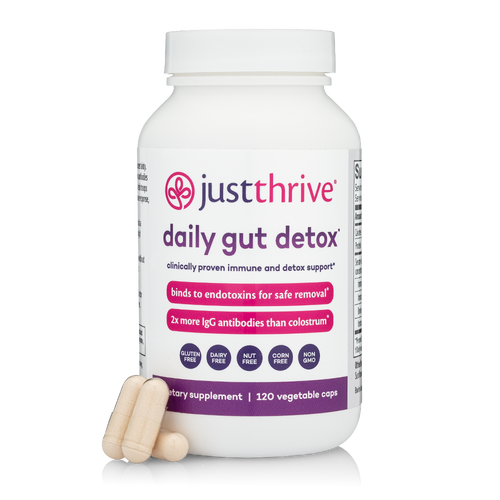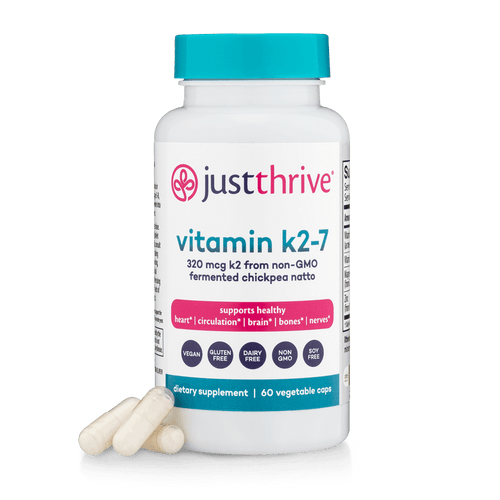This Simple Hack Can Change Your Life.
Your head feels like it’s being crushed by a metal band…
The constant throbbing feels like someone’s throwing rocks inside your head…
Every sound, smell, speck of light spikes the pain.
And until that headache is gone, it’s hard to do anything but lie alone in a cool, dark, silent room—but let’s face it, that’s not really an option most days.
The key to dealing with headaches—even migraines—is to stop them before they start. Keep reading to uncover the bacterial connection that may be behind your headaches and what you can do about it.
The Headache “Epidemic”
If you suffer from headaches, you’re not alone in that desperate search for relief. It’s one of the highest internet searches. Probably because around 45 million Americans suffer from headaches… and around 35 million suffer from migraines.
Unfortunately, you probably haven’t found a good way to make them stop. Over-the-counter and even prescription medications barely make a dent in the pain, and sometimes make you feel sick… or, worse, cause rebound headaches.
But there is a way to calm headaches down so they don’t happen as often or as intensely—and that can make a huge difference in your quality of life.

Know Your Headache
There are several types of headaches, and they will each affect you in different ways. Knowing which kind of headache you’re dealing with can help point you toward the right treatment options.
Primary headaches—meaning they aren’t caused by something like the flu or an injury—fall into a few different categories:
- Cluster headaches, which affect only one side of the head and happen daily for weeks
- Tension headaches, which cause dull pain, pressure, and tightness across the forehead
- Chronic daily headaches, which occur every day for at least 15 days every month for at least three months and cause moderate pain and tightness
- Triggered headaches, which may be brought on by coughing or straining, intense exercise, or sex
- Migraines, which cause severe throbbing, pulsing head pain typically accompanied by other symptoms such as nausea, vomiting, and extreme sensitivities
No matter which kind of headaches have been plaguing you, you just want the pain to stop so you can live your life.
Headache vs. Migraine
Headaches can be horrible, but migraines take that a step further. Migraine pain is usually debilitating, more so than other types of headaches. Migraines are more than just really bad headaches. In fact, a headache is just one of the symptoms of migraines. Others include:
- Photophobia - extreme sensitivity to light
- Intense pulsating pain
- One-sided pain
- Nausea and vomiting
- Severe sensitivity to smells and touch
Migraines often start with an aura, sort of like a warning sign, that causes you to see dots, zigzags, or blind spots in your vision. You may also feel dizzy or disoriented before the full migraine kicks in.
These killer headaches can last anywhere from 4 hours to 3 days, and they can strike regularly—like every month—or just occasionally. No matter how often or how long you’ve been dealing with migraines, you never want to experience that again.

Causes and Triggers
There are two things to look at when you’re dealing with headaches: causes and triggers. Specific biological changes cause headache pain. Triggers can set those causes in motion.
So what causes headaches? They’re brought on by overactivation of the pain sensors (called nociceptors) in your head. This can be due to things like constricted blood vessels, irritation of the nerve cells, chemical activity in your brain, or tight muscles in your head or neck.
It’s also important to know your headache triggers. Common triggers include:
- Stress
- Red wine or other alcohol
- Poor or skipped sleep
- Skipped meals
- Processed meats that contain nitrates
- Stress
- Caffeine
The problem: You can still get headaches or migraines even if you’re careful to avoid your triggers. And medications can lose effectiveness, cause side effects, or simply not work.
That’s why you’ll want to take a proactive approach to dealing with headaches, and you’ll probably be very surprised by the best approach to take.
The Headache-Gut Connection
Strange as it may sound, the key to taming headaches—especially migraines—starts in the gut. The gut microbiome, to be exact.
Your gut microbiome contains trillions of bacteria, both beneficial bacteria (probiotics) and harmful pathogens. When your gut is in healthy balance, probiotics vastly outnumber pathogens, and those beneficial probiotic bacteria keep you well in dozens of critical ways.
But when your gut is out of balance—a condition called dysbiosis—pathogens outnumber probiotics. And those pathogens wreak havoc on your health. They set off all sorts of damaging processes like stimulating inflammatory proteins, for example.[1]
And now research shows that dysbiosis can cause and trigger headache pain, including migraines.[2,3]
In one new clinical trial, researchers found that patients with both persistent and occasional migraines had gut dysbiosis. They also found that certain pathogenic bacteria were linked to more severe headache intensity and more frequent episodes.[4]
The good news: Keeping your gut microbiome in healthy balance can help you find relief.
The Healthy Gut Solution
It doesn’t take much to knock your gut microbiome out of balance and into a state of dysbiosis. A single course of antibiotics can do it.[5] One “standard American” sugary, fatty meal can do it.[6] Stressful events can shift your gut into dysbiosis.[7]
And if you’re prone to headaches or migraines, any of those dysbiosis drivers can lead to a painful episode… unless you take steps to keep your gut in healthy balance. The best way to do that is with high quality spore probiotics and targeted prebiotics—the preferred food of beneficial probiotic bacteria.
In a randomized double-blind controlled trial, women with migraines took a combination of probiotics and a special prebiotic called fructooligosaccharides (FOS) for 12 weeks. They saw improvements in many areas such as fewer attacks, reduced need for painkillers, and gastrointestinal comfort.[8]
Bottom line: Taking proactive steps to keep your gut healthy may be the best thing you can do for your headache problem as well as your overall health.
Tackle Headaches Head-on Just Thrive Probiotic and PREbiotic
You want to feel comfortable every day, not always worrying about the next bout that will knock you off your feet.
A healthy gut microbiome can help you get there by supporting your overall wellness and a balanced immune response.
Just Thrive Probiotic can help keep your gut stocked with plenty of beneficial bacteria. It contains four clinically-studied spore probiotics that have the unique ability to survive the journey through your stomach and digestion (most others cannot) to your gut where they work their magic. In fact, studies have proven that Just Thrive Probiotic arrives in your gut 100% alive, making it 1000x more effective than leading brands. These four super strains are:
- Bacillus indicus HU36™
- Bacillus subtilis HU58™
- Bacillus coagulans (SC-208)
- Bacillus clausii (SC-109)
And now you can choose how you want your probiotics: in easy to swallow capsules or delicious gummies! Both contain the same powerful combination of probiotic strains to supply your gut microbiome with beneficial bacteria.
Plus, you can encourage those probiotics to flourish by nourishing them with their favorite food: Just Thrive PREbiotic.
Just Thrive PREbiotic contains FOS (fructooligosaccharides) plus GOS (galactooligosaccharides) and XOS (xylooligosaccharides), three powerful prebiotic fibers that preferentially feed the probiotic bacteria you want in your gut. Just Thrive PREbiotic supports diverse desirable probiotic strains to maintain a healthy, well-balanced gut.
>> Don’t let headaches rule your life. Take the proactive step of adding Just Thrive Probiotic and Just Thrive PREbiotic into your daily routine with the Core Health bundle.
And if you’re feeling unsure about trying Just Thrive, we can help with that.
EVERY Just Thrive purchase is covered by our Bottom of the Bottle, 100% money back guarantee.
So you can try Just Thrive Probiotic and Just Thrive PREbiotic to see if they work for you… and we’re confident they will.
But if for any reason you don’t feel a difference, simply ask for a full product refund. Any time. Even if it’s 3 months or 3 years. Even if the bottle is empty! You’ll get your money back any time, no matter what.
>> Test drive the Core Health bundle 100% RISK FREE TODAY, and save on your first month’s subscription. Just apply code SUB30 at checkout.
- de Oliveira GLV, Cardoso CRB, Taneja V, Fasano A. Editorial: Intestinal Dysbiosis in Inflammatory Diseases. Front Immunol. 2021 Jul 30;12:727485. doi: 10.3389/fimmu.2021.727485. PMID: 34394133; PMCID: PMC8362080.
- Spekker E, Nagy-Grócz G. All Roads Lead to the Gut: The Importance of the Microbiota and Diet in Migraine. Neurol Int. 2023 Sep 13;15(3):1174-1190.
- He Q, Wang W, Xiong Y, Tao C, Ma L, Ma J, You C; International Headache Genetics Consortium. A causal effects of gut microbiota in the development of migraine. J Headache Pain. 2023 Jul 17;24(1):90.
- Yong D, Lee H, Min HG, Kim K, Oh HS, Chu MK. Altered gut microbiota in individuals with episodic and chronic migraine. Sci Rep. 2023 Jan 12;13(1):626.
- Kesavelu D, Jog P. Current understanding of antibiotic-associated dysbiosis and approaches for its management. Ther Adv Infect Dis. 2023 Feb 24;10:20499361231154443. doi: 10.1177/20499361231154443. PMID: 36860273; PMCID: PMC9969474.
- Brown K, DeCoffe D, Molcan E, Gibson DL. Diet-induced dysbiosis of the intestinal microbiota and the effects on immunity and disease. Nutrients. 2012 Aug;4(8):1095-119. doi: 10.3390/nu4081095. Epub 2012 Aug 21. Erratum in: Nutrients. 2012 Oct;4(11)1552-3. PMID: 23016134; PMCID: PMC3448089.
- Gao F, Guo R, Ma Q, Li Y, Wang W, Fan Y, Ju Y, Zhao B, Gao Y, Qian L, Yang Z, He X, Jin X, Liu Y, Peng Y, Chen C, Chen Y, Gao C, Zhu F, Ma X. Stressful events induce long-term gut microbiota dysbiosis and associated post-traumatic stress symptoms in healthcare workers fighting against COVID-19. J Affect Disord. 2022 Apr 15;303:187-195.
- Ghavami A, Khorvash F, Heidari Z, Khalesi S, Askari G. Effect of synbiotic supplementation on migraine characteristics and inflammatory biomarkers in women with migraine: Results of a randomized controlled trial. Pharmacol Res. 2021 Jul;169:105668.














